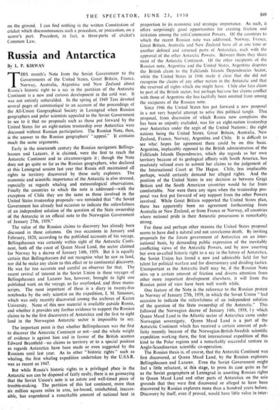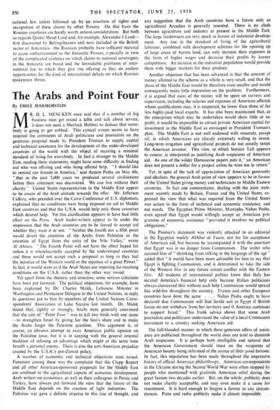Russia and Antarctica
B L. P. KIRWAN THIS month's Note from the Soviet Government to the Governments of the United States, Great- Britain, France, Norway, Australia, Argentina and New Zealand about Russia's historic right to a say in the partition of the Antarctic Continent is a new and curious development in the cold war. It
was not entirely unheralded. In the spring. of 1949 Tass devoted several pages of communiqué to an account of the proceedings of the All-Union Geographical Society in Leningrad when Russian geographers and polar scientists appealed to the Soviet Government to see to it that no proposals such as those put forward by the United States for an eight-nation trusteeship over Antarctica were discussed without Russian participation. The Russian Note, then, is the answer to the Russian geographers' " appeal." It contains much the same arguments.
Early in the nineteenth century the Russian navigators Bellings- hausen and Lazarev, it is claimed, were the first to reach the Antarctic Continent and to circumnavigate it ; though the Note does not go quite so far as the Russian geographers, who declared at this Leningrad session last year that Russia still maintained all rights to territory discovered by these early explorers. The economic and scientific importance of the Antarctic is also stressed, especially as regards whaling and meteorological observations. Finally the countries to which the note is addressed—with the exception of Chile they are the same as those involved in the United States trusteeship proposals—are reminded that " the Soviet Government has already had occasion to indicate the unlawfulness of an independent solution of the question of the State ownership of the Antarctic in an official note to the Norwegian Government of January 27th, 1939."
The value of the Russian claims to discovery has already been discussed in these columns. On two occasions in January and February, 1820, according to the published accounts of his voyage, Bellingshausen was certainly within sight of the Antarctic Conti- nent, both off the coast of Queen Maud Land, the sector claimed for Norway by a decree of January 14th, 1939. But it is equally certain that Bellingshausen did not recognise what he saw as land, nor did he make any claim to this effect or to continental discovery. He was far too accurate and careful an observer for that. The recent revival of interest in the Soviet Union in these voyages of Bellingshausen and Lazarev has, however, brought to light one published work on the voyage, so far overlooked, and three manu- scripts. The most important of these is a diary in twenty-five notebooks by the only scientist on the expedition, I. M. Simonov, which was only recently discovered among the archives of Kazan University. None of this new material is available outside Russia, and whether it provides any further evidence to support the Russian claims to be the first discoverers of Antarctica and the first to sight land in the Norwegian Antarctic sector is impossible to say.
The important point is that whether Bellingshausen was the first to discover the Antarctic Continent or not—and the whole weight of evidence is against him and in favour of the British seaman Edward Brangfield—no claims to territory or to a special position as regards Antarctica have been made or even suggested by the Russians until last year. As to other " historic rights " such as whaling, the first whaling expedition undertaken by the U.S.S.R. was as recent as 1947.
But while Russia's historic rights to a privileged place in the Antarctic sun can be disposed of fairly easily, there is no gainsaying that the Soviet Union's note is an astute and well-timed piece of trouble-making. The partition of this last continent, more than six million square miles in area, ice-bound, uninhabited, inacces- sible, has engendered a remarkable amount of 'national heat in proportion to its economic and strategic importance. As such, it offers surprisingly good opportunities for creating friction and irritation among the anti-Communist Powers. Of the countries to which the recent Russian note was addressed, Norway, France, Great Britain, Australia and New Zealand have all at one time or another defined and annexed parts of Antarctica, each with the approval of the other Antarctic Powers. Between them they share most of the Antarctic Continent. Of the other recipients of the Russian note, Argentina and the United States, Argentina disputes the British claim to the Falklands Islands Dependencies Sector, while the United States in 1946 made it clear that she did not recognise the claims of any other nation in the Antarctic and that she reserved all rights which she might have. Chile also lays claim to part of the British sector, but perhaps because her claims conflict with those of Argentina she has tactfully been omitted from among the recipients of the Russian note.
Since 1946 the United States has put forward a new proposal in a not very hopeful attempt to solve this political tangle. This proposal, from discussion of which Russia now complains she has been so unjustly excluded, was for an eight-nation trusteeship over Antarctica under the aegis of the United Nations ; the eight nations being the United States, Great Britain, Australia, New Zealand, France, Norway, Argentina and Chile. It is difficult to see what hopes for agreement there could be on this basis. Argentina, implacably opposed to the British administration of the Falklands Islands Dependencies, which she regards as her own territory because of its geological affinity with South America, has resolutely refused even to submit her claims to the judgement of the International Court at The Hague. Chile, less implacable perhaps, would certainly demand her alleged rights. And the position of the United States in any decision as between Gre#t Britain and the South American countries would be far from comfortable. Nor were there any signs when the trusteeship pro- posal was first put forward of any support from the other Powers involved. While Great Britain supported the United States plan, there has apparently been no agreement forthcoming from Australia or New Zealand, or from France or Norway, all countries where national pride in their Antarctic possessions is remarkably strong.
For these and perhaps other reasons the United States proposal seems to have died a natural and not unwelcome death. By inviting proposals for the future government of Antarctica on an inter- national basis, by demanding public expression of the inevitably conflicting views of the Antarctic Powers, and by now asserting her own so-called historic right to a say in the future of Antarctica, the Soviet Union has found a new and admirable field for her talent for politic'al warfare and for diversionary and dividing tactics. Unimportant as the Antarctic itself may be, if the Russian Note stirs up a certain amount of friction and diverts attention from other more important development elsewhere, it will from the Russian point of view have been well worth while.
One feature of the Note is the reference to the Russian protest to Norway of January 27th, 1939, in which the Soviet Union " had occasion to indicate the unlawfulness of an independent solution of the question of the State ownership of the Antarctic." This followed the Norwegian decree of January 14th, 1939, l y which Queen Maud Land in the Atlantic sector of Antarctica came under Norwegian sovereignty. Queen Maud Land is a part of the Antarctic Continent which has received a certain amount of pub- licity recently because of the Norwegian-British-Swedish scientific expedition working there, the first international expedition of this kind to the Polar regions and a remarkably successful venture in Anglo-Scandinavian scientific co-operation.
The Russian thesis is, of course, that the Antarctic Continent was first discovered, at Queen Maud Land, by the Russian explorers Bellingshausen and Lazarev. Even the Soviet Government might feel a little reluctant, at this stage, to press its case quite as far as the Soviet geographers at Leningrad in asserting Russian rights to Queen Maud Land and other parts of Antarctica on the sole grounds that they were first discovered or alleged to have been discovered by Russian explorers more than a hundred years before. Discovery by itself, even if proved, would have little value in inter- national law unless followed up by an assertion of rights and recognition of these claims by other Powers. On this basis the Russian assertions are hardly worth serious consideration. But both as regards Queen Maud Land and, for example, Alexander I Land— first discovered by Bellingshausen and now included in the British sector of Antarctica—the Russians probably have sufficient material to cause embarrassment to the Antarctic Powers, especially in view of the complicated evidence on which claims to national sovereignty in the Antarctic are based and the formidable problems of inter- national law to which they give rise offering as they do endless opportunities for the kind of international debate on which Russian spokesmen thrive.



































 Previous page
Previous page